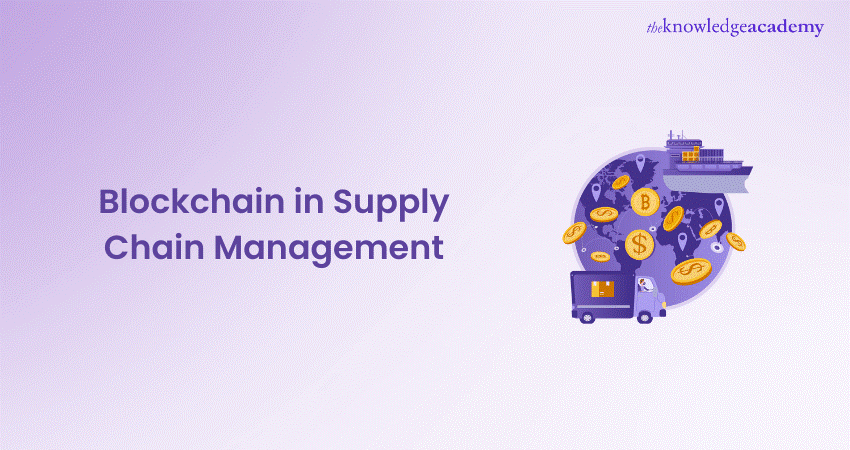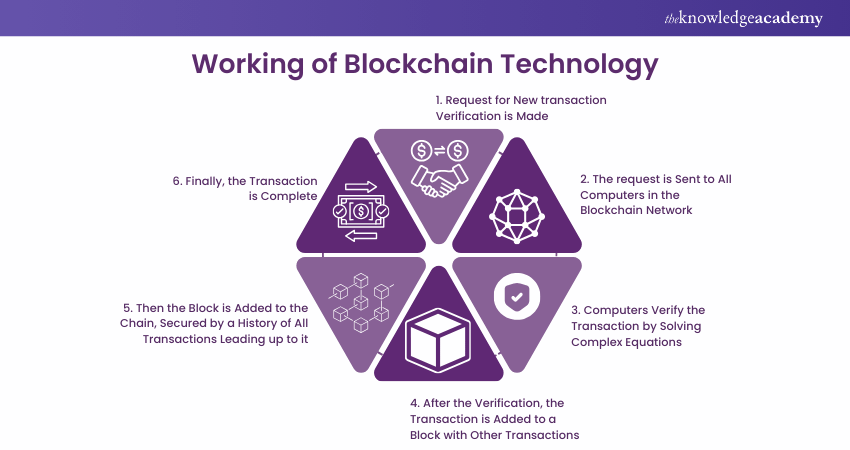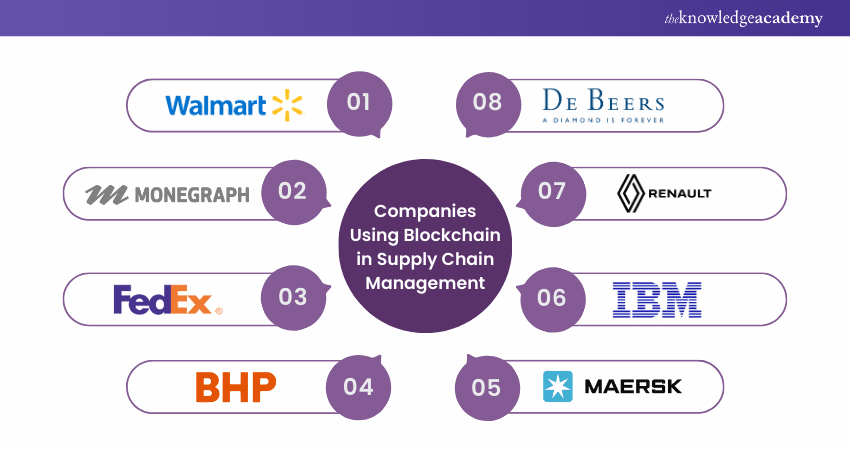We may not have the course you’re looking for. If you enquire or give us a call on 01344203999 and speak to our training experts, we may still be able to help with your training requirements.
We ensure quality, budget-alignment, and timely delivery by our expert instructors.

Imagine a world where every product's journey from manufacturer to consumer is transparent, secure, and efficient. This vision is becoming a reality with Blockchain in Supply Chain Management. By integrating Blockchain technology, businesses are revolutionising their Supply Chain operations, ensuring each step is recorded and verifiable.
According to Statista, the advantages of Blockchain are so much so that the global spending on Blockchain solutions will reach £16 Billion by the end of 2025. One primary industry that is making huge contributions to this is the Supply Chain industry. Using this technology in Supply Chain is solving significant challenges in the industry that kept it lagging over the years. Let's delve into how Blockchain in Supply Chain Management is transforming the industry, enhancing transparency, efficiency, and security.
Table of Contents
1) What is Blockchain Technology?
2) What is Supply Chain?
3) Why Use Blockchain for Supply Chain Management?
4) How does Blockchain in Supply Chain Provide Value?
5) Companies Using Blockchain in Supply Chain Management
6) Future of Blockchain in Supply Chain Management
7) What to Consider Before Switching to Blockchain?
8) Conclusion
What is Blockchain Technology?
The word "Blockchain" comes from the "blocks" of verified and immutable transactions and how they connect to form a chain. Therefore, the term "Blockchain" was created. This technology gained immense popularity for its ability to validate, record, and distribute transactions in immutable, encrypted ledgers.
Blockchain Technology is mainly famous for its decentralised ledger, which records and protects transaction details and makes them tamper resistant. A peer-to-peer network of numerous connected computers, or nodes, receives a broadcast when a transaction is requested on the system.
Each of them solves equations across the network to verify and confirm the transaction. Once the transaction has been verified, it is compiled with other transactions to form a block of information for the ledger.

Blockchain Technology was a game-changer in the financial world, as it supports digital-record keeping for Cryptocurrency transactions. Bitcoin Blockchain, Ethereum Blockchain, and Dogecoin are some popular Cryptocurrencies that use this technology to enable limitless and anonymous participants to conduct transactions without needing a facilitator. Cryptocurrencies that use this technology to enable limitless and anonymous participants to conduct transactions without needing a facilitator.
This latest technological innovation has disrupted traditional Supply Chain practices. Businesses are increasingly adopting Blockchain Supply Chain. Let's first understand what Supply Chain is in detail in the next section.
Refer to these Blockchain Interview Questions and Answers to crack your next job interview!
What is Supply Chain?
A Supply Chain is a network consisting of individuals and companies involved in creating a product and delivering it to the end consumer. The chain begins with producers of the raw materials andends when the finished product is delivered to the end user.
Supply Chain Management (SCM) is a crucial process. It is believed that a proper management gives birth to an optimised Supply Chain. It results in lower costs and a more efficient production cycle through and through. Companies are at constant need of improving their Supply Chains so they can enhance their productivity, reduce their costs and remain on the competitive edge always.
Ensuring that the Supply Chain Management is efficient is a must, as businesses and consumers want companies to guarantee product authenticity. In comparison, the stakeholders involved in the Supply Chain demand responsible sourcing, logistics and transparency in transactions to minimise waste and disputes.
Blockchain is transforming Supply Chains by making them more transparent. This transparency makes the system secure and efficient. To make it easier; you can look at it as big chain where every link represents a step. These steps show the entire process in getting a product ready from scratch to your hands.
Why Use Blockchain for Supply Chain Management?
To meet today’s Supply Chain challenges, an organisation must bring all its disparate logistical data and processes onto a single platform. This platform should enable the information to be aggregated, analysed, validated, and showcased as orders are processed, packaged, and dispatched. The more integrated, granular, and comprehensive these platforms, the greater the cost saving and efficiency they can generate.
Blockchain’s digital ledger technology offers a level of granularity and certitude that traditional solutions can’t in the context of Supply Chain. Collaboration and trust can be achieved more easily since all the data is controlled transparently across a distributed network. This makes Blockchain in Supply Chain Management highly desirable.
How Does Blockchain in Supply Chain Provide Value?
Here, we will discuss the various benefits businesses employing Blockchain Supply Chain gain:
Increased Efficiency
As Blockchain relies on a shared peer-to-peer network, it improves communication and collaboration for all stakeholders involved. It increases efficiency in Supply Chain through greater traceability, thus eliminating waste, duplicate orders and invoice fraud.
It allows companies to complete transactions without third-party involvement. Contract compliance encourages all the stakeholders to meet their agreed-upon obligations on time. Complete transparency in financial transactions improves business performance and reduces uncertainty and risk.
Blockchain is integrated with Radio-frequency Identification (RFID) tags that use electromagnetic fields to identify and track items in the Supply Chain.
Efficient Record Keeping
Blockchain helps in managing the Supply Chain more efficiently, as multiple parties can keep track of price, date, location, quality, certification, and other pertinent information. This has the added benefit of needing less manual documentation about the details of product and its supply process.
Data Exchange
Blockchain serves as an excellent solution where data needs to be exchanged between multiple parties, ensuring transparency. This also promises better trust between two or more parties in the Supply Chain, as transparency reduces the potential of fraudulent activities.
Ethical and Sustainable Sourcing
It is simpler to confirm where materials and things come from, where they go as they move through the Supply Chain, and who has access to them, thanks to Blockchain's traceability and tamper-resistance advantage.
Transparency and Visibility
Blockchain-supported Supply Chains are highly transparent as records on Blockchain cannot be erased once entered. Additionally, because every step in the Supply Chain is securely recorded, logistics problems may be quickly traced to the source problem. The same is valid for obtaining raw materials or components that can be used to track down their place of origin and improve accountability and transparency.
Additionally, it strengthens corporate reputation by providing transparency of materials used in products.
Saving Costs
There will be less stock loss and waste with Blockchain Technology, thereby leading to huge cost savings. A distributed network of Blockchains that shares resources and transactions digitally eliminates the necessity for paper-based workflows and materials. Going paperless reduces expenses not only in terms of materials but also in terms of storage and labour needed to process and manage all those physical documents.
Integration With Other Technologies
Blockchain easily incorporates other modern technologies like process automation and Internet of Things (IoT) devices like smart sensors and RFID tags to further increase efficiency, visibility, and accuracy throughout the Supply Chain.
Learn how Bitcoins work and how Bitcoins are made secured by joining Bitcoin and Cryptocurrency Course!
Companies Using Blockchain in Supply Chain Management
Read further to understand the use cases of Blockchain Technology that represent how it has already changed the Supply Chain worldwide:

Walmart
It tested an application using Blockchain Technology that traces pork in China and produces it in the USA. This helped authenticate transactions and the accuracy of record keeping.
Monegraph
Monegraph was founded in 2014, uses Blockchain technology to protect the usage and sharing rights of digital media. It includes video snippets or brand-sponsored material, and it also makes it possible for media creators, publishers, and distributors to share in the profits.
FedEx
FedEx has incorporated Blockchain Technology into its chain of custody in order to enhance traceability, offer a reliable record, and help resolve consumer complaints. The business is a strong proponent of the development of a Blockchain-based industry standard and has joined the Blockchain in Transport Alliance (BiTA).
Giant Mining Company
Giant mining company BHP is adopting Blockchain to digitally transform its business processes, using Blockchain technology. This will help them authenticate their suppliers and guarantee that all environmental, social, and governance standards are upheld across the Supply Chain. By integrating Supply Chain Digital Twins, BHP can further enhance transparency and efficiency, creating a more resilient and data-driven supply network. With China Baowu Steel, the business finalised its first Blockchain iron ore deal in 2017 for about £12 million. With China Baowu Steel, the business finalised its first Blockchain iron ore deal in 2017 for about £12 million.
Famous companies like Maersk and IBM are employing this technology for cross-border, cross-party transactions to improve process efficiency.
The famous automobile company Renault is moving its Supply Chain documentation to Blockchain. With its distributed ledger, Blockchain allows sharing and tracking of information when multiple parties are involved. This is also encouraging other companies to adopt this technology.
DeBeers
DeBeers is keeping track of the origin and development of every single natural diamond they mine using Blockchain Technology. It will not only boost productivity and inventory management but also aid the business in addressing client concerns about the ethical sourcing of gemstones.
Future of Blockchain in Supply Chain Management
Blockchain comes with added benefits that can curb the issues, which have existed in Supply Chain for a relatively long time. One of such benefits is its transparency, due to the decentralised nature of Blockchain and its transparency, it is possible to track an order or product from its state of manufacture to the final destination. This can lead to a higher ethical standard for the Supply Chainand reducing the opportunities of malpractice within the supply system. This as whole would result in better relations with your customers and greater trust from general public.
Blockchain can also reduce a significant amount of paperwork, as majority of information will be available on all instances to every party evolved freely, thus preventing the need to document them manually in a centralised data base or storage. This is still considered a distant dream due to the fact that Blockchain is considered a developing technology. Its initial stages make it hard to predict the integration methods necessary, to make the Supply Chain better, but it is likely that as time progresses Blockchain methods will become more prominent within Supply Chain.
What to Consider Before Switching to Blockchain
Every company has its own needs and a unique Supply Chain. However, there are some essential factors to consider when considering using a Blockchain platform. We explore them below:
Public vs Private Platforms
Your first significant choice is whether to use a public or private Blockchain. Let’s explore both options
1) Public Blockchains:
a) Bitcoin and Ethereum are widely known examples of Public Blockchains.
b) Public Blockchains offers features such as distributed, encrypted ledger on a peer-to-peer network open to anyone.
c) Ethereum Supports Smart Contracts and approximately 3,000 Decentralised Apps (dApps), primarily for payments and financial services.
d) Public Blockchains are ideal for startups whose Turnkey solutions makes them conducive to industry disruption
2) Private (Permissioned) Blockchains:
a) Private Blockchains are preferred by established companies due to customisability. They allow businesses to design solutions with advanced privacy controls.
b) In this case the data sharing is limited to authenticated, authorised members.
c) Private Blockchains works in peer-to-peer network which can improve speed, scalability, and reduce development costs.
Evaluating Permissioned Blockchains
If an organisation opts for a permissioned Blockchain, numerous platforms merit consideration. Some of the good options of permissioned Blockchains Include:
a) Hyperledger Fabric, which enables companies to develop their own networks.
b) R3’s Corda is used on finance-related projects to track and trade digital assets.
c) The Quorum platform developed by JPMorgan Chase is another one intended for financial services.
d) Ethereum, although public, operates a private network isolated from its main Blockchain which appeals specifically to enterprises seeking more privacy.
Conclusion
The Era of Blockchain Technology has just started and is here to stay for a good time. As part of this evolution, Mining Dogecoin is becoming a key player in decentralized networks, alongside Blockchain in Supply Chain, which provides several solutions for the many challenges the Supply Chain sector faces today. So, continue learning as the technology advances.
Become an Ethereum Developer by signing up for the Ethereum Developer Training course.
Frequently Asked Questions
What are the different types of Blockchain used in Supply Chains?

The different types of Blockchain in Supply Chain fall under the three categories of Public, Private and Hybrid.
What are the challenges of implementing Blockchain in Supply Chains?

Some of the challenges of implementing Blockchain in Supply Chain Management include Complexity, scalability, interoperability, legal and Regulatory Compliance, high Initial and maintenance Costs, energy Consumption and privacy Concerns
What are the Other Resources and Offers Provided by The Knowledge Academy?

The Knowledge Academy takes global learning to new heights, offering over 3,000 online courses across 490+ locations in 190+ countries. This expansive reach ensures accessibility and convenience for learners worldwide.
Alongside our diverse Online Course Catalogue, encompassing 19 major categories, we go the extra mile by providing a plethora of free educational Online Resources like News updates, Blogs, videos, webinars, and interview questions. Tailoring learning experiences further, professionals can maximise value with customisable Course Bundles of TKA.
What is The Knowledge Pass, and How Does it Work?

The Knowledge Academy’s Knowledge Pass, a prepaid voucher, adds another layer of flexibility, allowing course bookings over a 12-month period. Join us on a journey where education knows no bounds.
What are Related Courses and Blogs Provided by The Knowledge Academy?

The Knowledge Academy offers various Advanced Technology Courses, including Bitcoin and Cryptocurrency Course, Ethereum Developer Training, Conda Training, and Quantum Computing Training. These courses cater to different skill levels, providing comprehensive insights into Supply Chain Digital Twin.
Our Advanced Technology Blogs cover a range of topics related to Blockchain, offering valuable resources, best practices, and industry insights. Whether you are a beginner or looking to advance your Supply Chain Management skills, The Knowledge Academy's diverse courses and informative blogs have got you covered.
Upcoming Advanced Technology Resources Batches & Dates
Date
 Blockchain Training Course
Blockchain Training Course
Thu 3rd Apr 2025
Thu 5th Jun 2025
Thu 7th Aug 2025
Thu 2nd Oct 2025
Thu 4th Dec 2025






 Top Rated Course
Top Rated Course



 If you wish to make any changes to your course, please
If you wish to make any changes to your course, please


